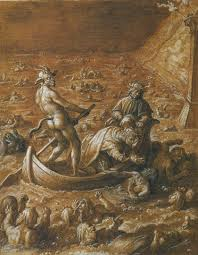Dante was born in Florence in 1265, but we do not know yet very much about him, mainly on his early years. His father was probably a money-change, but Forese Donati said that he was a moneylender (1). Somehow or other, we may consider, that Forese Donati was both one of the most famous poets in Tuscany, and a fierce enemy of Dante. It is also true, that Dante never mentioned his father in all his works, which is a conclusive evidence of probable strong contrasts between Dante and his father. We also do not know almost nothing on Dante’s early formative years, but, according to tradition, he studied under Master Brunetto Latini and then it seems he continued his studies in philosophy at the University of Bologna. Dante frequented the best society of Florence and he was one of the best friends of Guido Cavalcanti, who belonged to the so-called “Dolce stil novo”, where only selected poets were accepted.
During his childhood, Dante met Beatrice (Bice) Portinari, born by an eminent Florentine family. Dante was almost fascinated by her, then transformed, according to the “Comedy” in “figura Christi”, that is in his spiritual guide in the “Paradise”. According to studies, Dante’s family was probably of peasant origins, if it is true that the “Alagherii” had their roots in the so-called “Val di Pado” ( Ferrara). Dante was a commendable soldier, and he fought valiantly in the battle of Campaldino. After military service, Dante started in politics, and this marked his life forever. As a “Prior” Dante was obliged to make potentially dangerous decisions against illustrious personages of Florence, such as the powerful noble Guido Cavalcanti, his old friend, who however, in spite of everything, was exiled by him.
Important members of the Florentine aristocracy whipped up hatred against Dante, and, for his priorship, he was sentenced first to perpetual exile (1301) and later to death. Dante was exiled when he was at Rome at the papal curia of Boniface VIII, who was strongly disliked by Dante for his attempts to bring Florence within the sphere of domination of the Papacy. The exile marked for ever Dante’s life, who, in spite all his efforts, was unable to return to his homeland.
However, the exile inspired him the “Divine Comedy”, or better “Comedìa”, because the adjective “Divine” was adjoined by a fervent follower of Dante, that is Giovanni Boccaccio, the well-known author of the Decameron.. During two decades, Dante suffered a lifelong banishment from Florence. However, Dante was almost entirely supported by the benevolence of many noble lords at that time. Dante wandered thought Italy, and he chose Ravenna as his permanent domicile, where he died of malarial fevers in 1321.
Endnote
1) Forese Donati was the brother of Corso Donati, the Chief of the Blacks in Florence (Sonnet LXXIV), See Dante’s “Rime”, edited by Gianfranco Contini, Torino, Einaudi,
